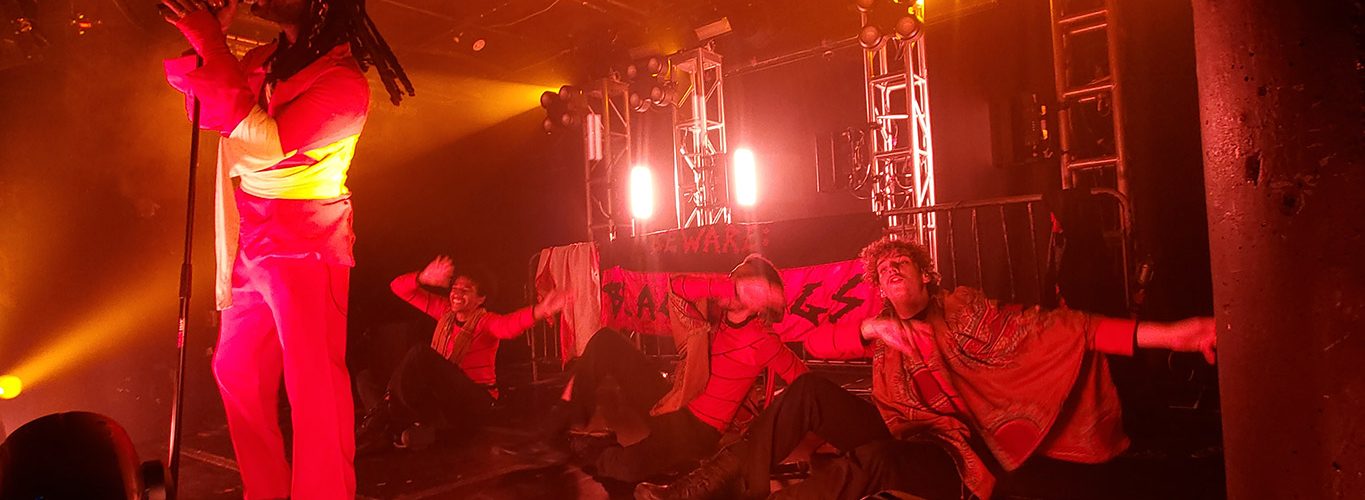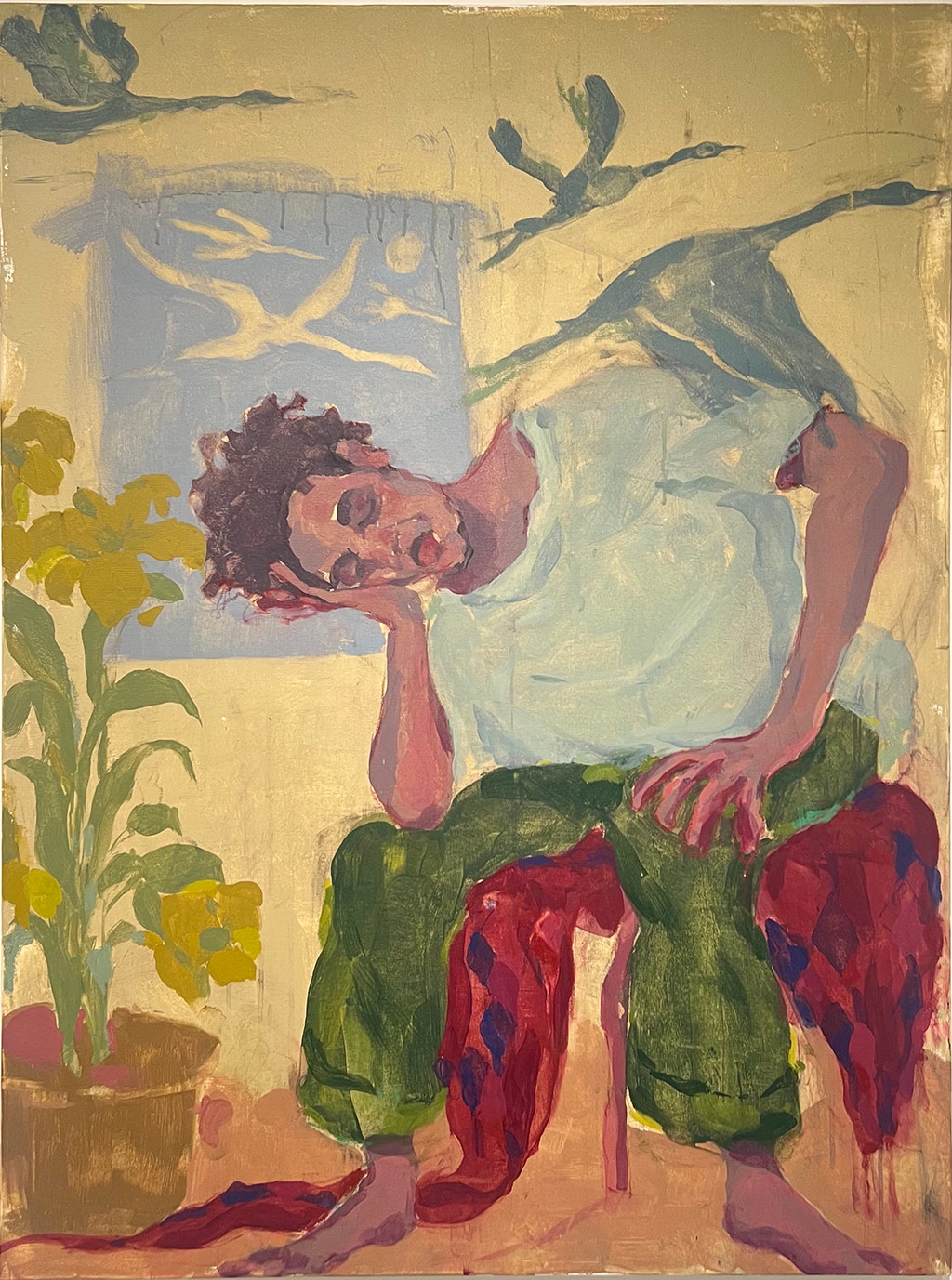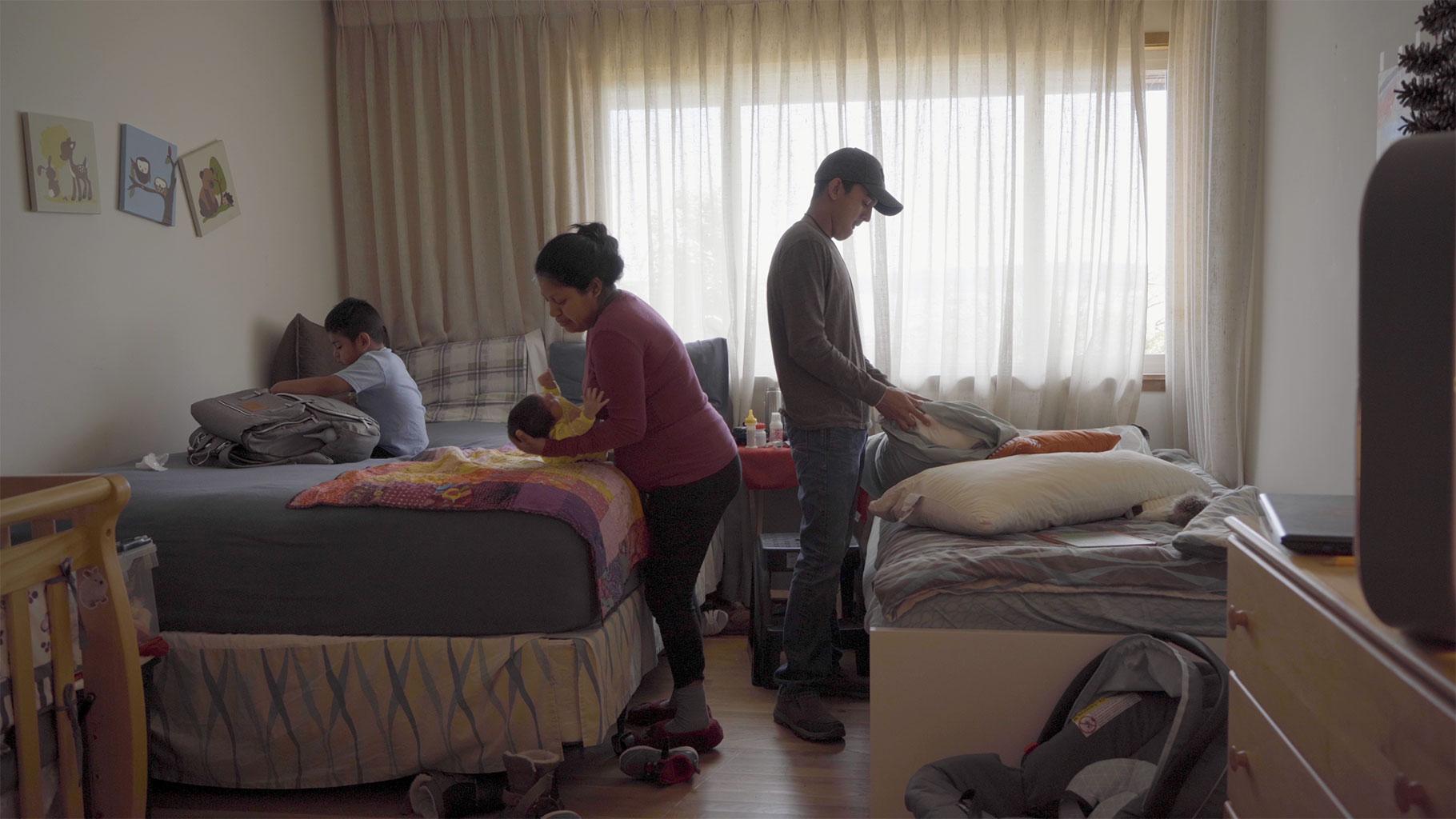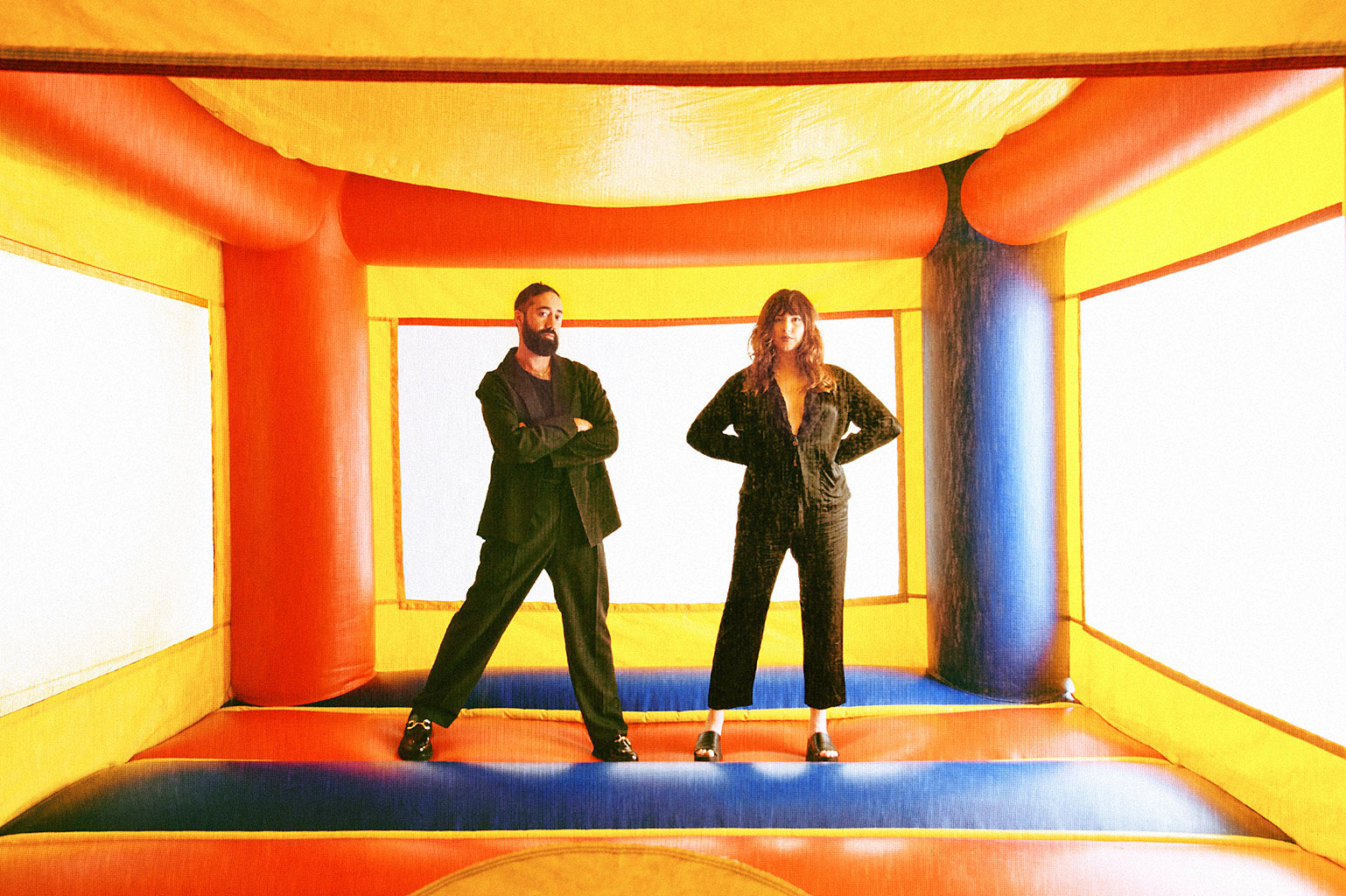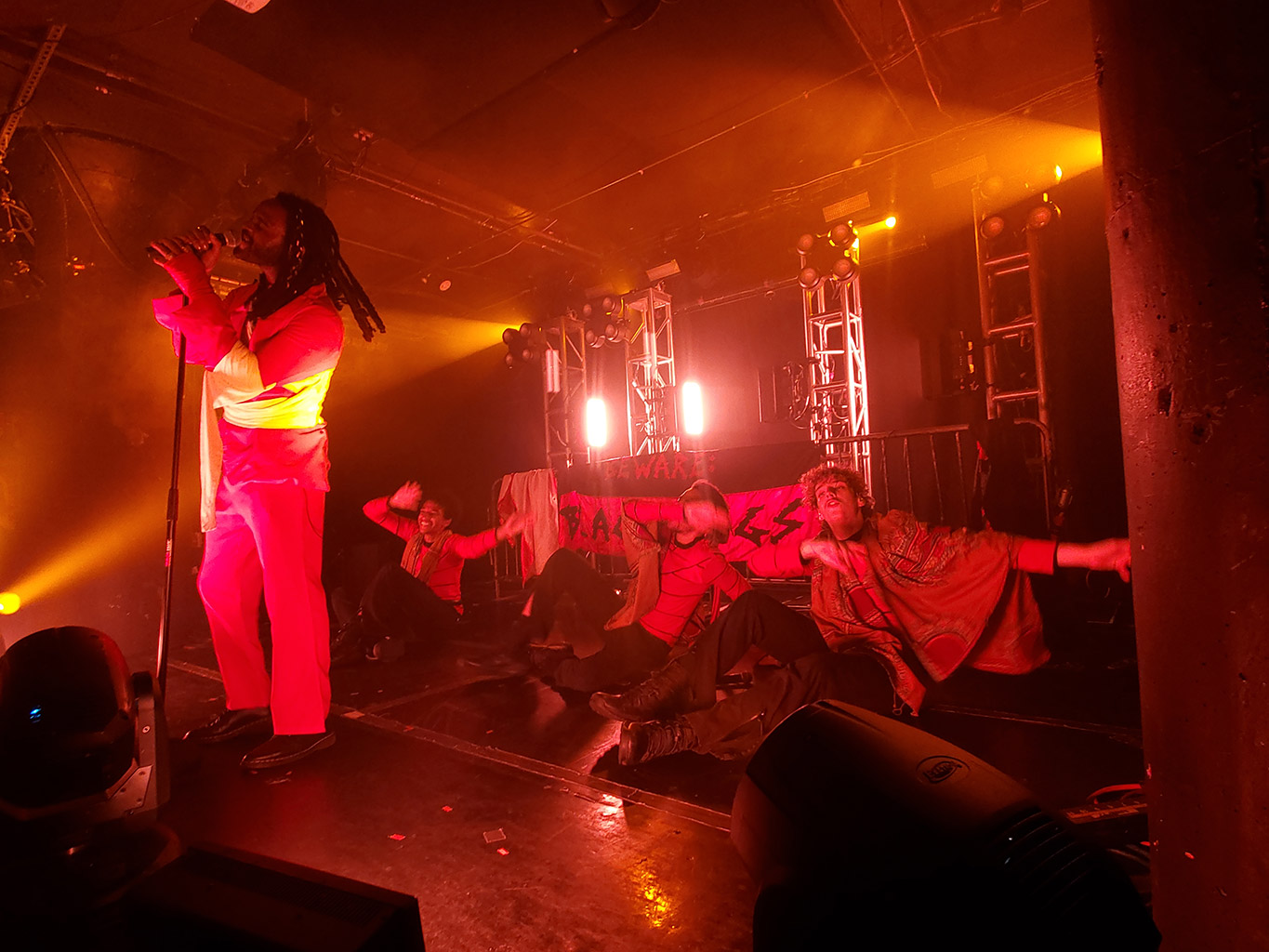
The first indicator that a Genesis Owusu show would be unlike any other comes as Owusu’s three goons army-march on-stage, their faces covered in balaklavas that connect to shrug top sweaters; their lanky bodies clad in asymmetrical red and black wardrobes which read something like off-kilter Spidermen. Between their hands, they carry a large silken banner which reads, “BEWARE: BLACK DOGS,” in massive font. They tromp onstage militaristically at first — soon to explode into delightfully head-scratching dance movements which adhere to no style of dance in particular. They gleefully present an amalgam of high-stepping, zombie-walking moves which alternate energetically between moshpit vibes and a playful afternoon outing among mischievous friends.
The entirety of the Genesis Owusu show will go on to feel as such: hard to box in and full of tonal shifts. Colorful lighting cues and strobes going a long way to heighten the dynamism, creating an atmosphere for Owusu to show off his ability to stay fluid across many genres and moods.
Owusu takes the stage with the facial bandages, gold grills, gold chains, and gold hair wraps which he has come to be associated with throughout his recent record cycles. Owusu himself is also quite the movement artist, creating for himself a particular physical language of freeze-frame poses which he falls back on throughout the course of the evening. One repeated phrase is a strongman posture where he pulls down from an imaginary pull-up bar, landing with both biceps flexed and one foot heel daintily lifted.
Also present are moments where letting go — rather than holding still — are the main prerogative. In the R&B-smooth “Waiting on You,” a chaotic breakbeat breakdown is added, creating space for Owusu to free-form let loose and cathartically dance his way across the stage as though he were a punk rocker given free reign to explore contemporary dance.
In my 2021 interview with Owusu, Ohe mentions, “[Smiling with No Teeth] is a very personal project for me… it’s a relaying of rage, sorrow, happiness, joy, hopefulness… which are things that I think are all extremely valid. For the longest time, Black people, especially, have been wronged and then expected to be the bigger person, and then expected to be the educators for the people who just wronged them.”
“[Your] feelings of rage are then invalidated,” he continues. “You’re made to feel hysterical or paranoid… so this is moreso an intention and a statement of those raw feelings, whether logical or not.”
When the goons return, they high-step their way onto the stage with a energetic dance number which matches a brutal, rapid-fire rap from Owusu. Together, they yell, “Shout to the void!” as if they were working off hateful energy — then become stoic as they offer up an alternate rendition of the famous military march song, “Jody,” which serves as an introduction to “I Don’t See Colour,” a blistering track which critiques society’s prejudiced judgments on people of color.
Owusu and the goons march in place and offer-up a call-and-response to the audience, who repeat every line eagerly. “I don’t know what I’ve been told!” they shout. “Your racist shit is fucking old!”
The crowd also applauds supportively when Owusu urges them to, “Make some noise if you don’t fuck with Nazi scum,”
“That’s good to know,” Owusu responds. “Because if you do, this one’s for you.” They then launch into “Whip Cracker” with an intensity that seems to hold the weight of centuries of oppression from white supremacy. Sample lyrics from the track read:
Whip your hands, whip your ass
Whip your man’s whip
This ain’t the 50s, you ain’t talkin’ shit
Know your place, know your role
‘Fore you get tripped
You ain’t no masters
Your place has been flipped
The funky post-punk groove of the track could very well be playful if not for the seriousness of the deeper message, which Owusu and crew bring to life with downwards punches and shouts of, “Spit up on your grave!” With tension still riding high, everything quickly falls into darkness as Owusu ducks behind the stage at the end of the track. The mood in the room feels strange and purposely elusive. One gets the sense something is about to shift.
And shift it does. Energetically spitting on graves and punching the oppressors seem to make way for transmutation. Owusu emerges again wearing a bright red suit and strips the balaclavas off his goons, revealing young Black men who — now free from their chained-up clothing — embody the joyful exuberance of young children. Smiles are huge on their faces as they sing or lip-synced every lyric of every track to come and hop around the stage as if they don’t have a care in the world.
The remainder of the set is good-natured warmth and pure pleasure, with the crew even descending into the audience for a brief, playful moshpit. Call-and-response sessions continue on as well, and Owusu has the audience so much in the palm of his hands that at some point he is able to “play” the audience as though her were playing a theremin. As he raises and lowers his hands at various velocities and cadences, the audience offers up sustained, melodic sounds in exact timing with his orchestration. As an audience member, I find myself cheesing so hard that I feel downright ridiculous for being so amused by simple antics. Eavesdropping later, I would hear numerous audience members say that it was the best show they had been to — whether since the pandemic lifted or perhaps even “ever.” Many were there for the first time — brought there by friends preaching the gospel of Genesis Owusu — and from what I could tell, none were disappointed at all.
Ω

